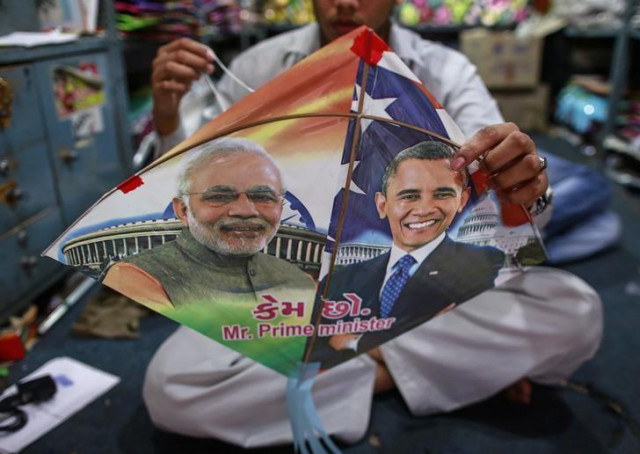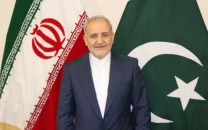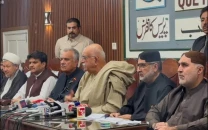Uncle Sam's tight India embrace
The foreign ministry needs a thorough overhaul to counter the aggressive Indian narrative

An employee ties threads on a kite, with portraits of Indian Prime Minister Narendra Modi (L) and US President Barack Obama, ahead of Obama's visit, in Mumbai. PHOTO: REUTERS
The big defence deal
While Pakistan and China ponder over various aspects of a logistical corridor to the Arabian Sea that will extend all the way to Africa, this week’s most important headline from across the Atlantic is a string of agreements the Indian defence minister is set to sign in Washington.
The time for India’s offer for the US to use its bases right after 9/11 seems to have finally come. In return, Delhi gets access to any US facility around the globe, some of which are located in Gulf countries, such as Qatar, Bahrain and Kuwait. It remains to be seen if the countries hosting the US bases will have to approve such a third party use of the military facility.
US, India to discuss business ties, tensions with Pakistan
Besides the Logistics Exchange Memorandum of Agreement, the two countries are thrashing out modalities for the Communications Interoperability and Security Memorandum of Agreement and Basic Exchange and Cooperation Agreement for Geo-spatial Cooperation. The plethora of acronyms is no eyewash but a real strategic earthquake for countries like Pakistan and India, and even beyond. According to earlier news, the Lockheed Martin will manufacture the latest version of F-16 Block 70/72 (against Pakistan’s F-16 Block 50/52) in India. The news coincided with a similar one from Russia that agreed to establish a joint logistics centre to support Indian Air Force’s Su-30 fighter jets with Indian initial investment of $300 million.
Thanks to multi-pronged foreign technological patronage, Delhi, which took three decades to produce a light combat aircraft, became the fourth country to test and produce scram jet engines.
During his ongoing visit, Indian Defence Minister Manohar Parrikar aimed to impress upon the US for the sale of Predator drones. Even if this does not materialise this time around, it will be delivered at a later time. India-US trajectory of relations started to sharply change in the early-2000s. It took India a decade and a half to gain similar significance in US foreign and security policy to that of Australia or South Korea.
Russia is irked
The strategic development emanates from the Obama administration’s ‘pivot’ to Asia. Indian diplomacy seems at its best with the country receiving high-level Russian support in the military hardware domain, including acquisition/lease of nuclear submarines, joint development of T-50 fighter jet and production of BrahMos cruise missiles, to name a few. Though Putin himself admitted the US was the world’s sole superpower, he might be upset about the Indian military facilities being at US disposal. In the long term, Russia will see reduced Indian dependence on Russian weaponry. China, on the other hand, is intensifying technological cooperation with Russia.
Modi wants deeper US-India security relationship
The trade-off
The US has already put its weight behind India for its entry into Missile Technology Control Regime and Nuclear Supply Group. Washington also backs Delhi’s quest for permanent seat in the United Nations Security Council.
However impressive, it remains that the deal comes at a price for India. Delhi will be at Washington’s disposal for dealing with problems born out of US policies during and after the Cold War. Besides the mess NATO and US strategic partners such as Australia and India inherit in the Middle East and North Africa, the mammoth challenge that lies ahead is of China’s economic might and globalised strategic outreach through One-Belt-One-Road.
Plan of action for Pakistan
The recent development on US-India strategic plain, however, doesn’t write off Pakistan as a sovereign state. Pakistan-China will sooner or later reach similar agreements, understanding for which remains deliberately understated. The most obvious consequence of Indo-US strategic embrace will be Pakistan and China intensifying reliance on nuclear deterrence, especially the focus on tactical nuclear weapons, further advancement in nuclear yield, refinement in delivery systems and anti-ballistic missiles, and early warning systems and counter-countermeasures.
India, US closer to pact to share military logistics: officials
Against all odds, Islamabad has not significantly reduced its nuclear research and development programmes. Moreover, China is already engaged in revising its nuclear doctrine and upgrading its nuclear arsenal. Sino-Pakistan cooperation does not provide Islamabad a red card against its adversary’s strategy and tactics by any means. The improved security atmosphere at home requires intense public and economic diplomacy. Pakistan’s diplomatic missions across the world relate to the 1980s by any means. The foreign ministry needs a thorough overhaul to not only counter the aggressive Indian narrative but also to portray the realistic image of the country. Islamabad’s ambassadors in the friendliest of countries remain laidback, barring a few exceptions such as Turkey, Jordan and Canada. Ironically, there’s little talk of reforming and restructuring Pakistan’s lousy foreign service.
Naveed Ahmad is a Pakistani investigative journalist and academic with extensive reporting experience in the Middle East and North Africa. He is based in Doha and Istanbul. He tweets @naveed360



















COMMENTS
Comments are moderated and generally will be posted if they are on-topic and not abusive.
For more information, please see our Comments FAQ